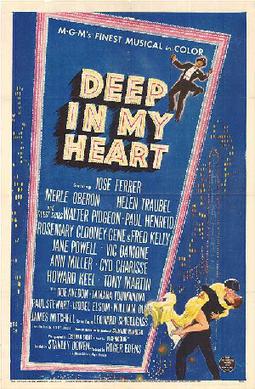| Deep in My Heart | |
|---|---|
 Theatrical release poster | |
| Directed by | Stanley Donen |
| Screenplay by | Leonard Spigelgass Elliott Arnold (book) |
| Produced by | Roger Edens |
| Starring | José Ferrer Merle Oberon Helen Traubel Walter Pidgeon Paul Henreid Rosemary Clooney Gene Kelly Fred Kelly Jane Powell Vic Damone Ann Miller Cyd Charisse Howard Keel Tony Martin Doe Avedon Tamara Toumanova Paul Stewart Isobel Elsom William Olvis James Mitchell |
| Cinematography | George J. Folsey |
| Edited by | Adrienne Fazan |
| Music by | Sigmund Romberg |
Production company | |
| Distributed by | Loew's, Inc |
Release date |
|
Running time | 132 minutes |
| Country | United States |
| Language | English |
| Budget | $2,504,000 [1] |
| Box office | $3,978,000 [1] |
Deep in My Heart is a 1954 American MGM biographical musical film about the life of operetta composer Sigmund Romberg, who wrote the music for The Student Prince , The Desert Song , and The New Moon , among others. Leonard Spigelgass adapted the film from Elliott Arnold's 1949 biography of the same name. Roger Edens produced, Stanley Donen directed and Eugene Loring choreographed. José Ferrer played Romberg, with support from soprano Helen Traubel as a fictional character and Merle Oberon as actress, playwright, librettist, producer, and director Dorothy Donnelly.
Contents
- Cast
- Musical numbers
- Box office
- Reception and distribution
- References
- Further reading
- External links
The film, which takes its title from "Deep in My Heart, Dear," a song from The Student Prince , primarily consists of a series of cameo turns by nearly every significant singer or dancer on the MGM lot at the time. These include dancer Cyd Charisse (dubbed by Carol Richards), Rosemary Clooney (Ferrer's wife), Vic Damone, Howard Keel, Gene Kelly and his brother Fred Kelly (their only on-screen appearance together), Tony Martin, Ann Miller, James Mitchell, Jane Powell, Joan Weldon, and the ballerina Tamara Toumanova (dubbed by Betty Wand). Robert Easton, Russ Tamblyn [2] , Susan Luckey, and Ludwig Stössel make uncredited appearances.
Deep in My Heart was the final film in a series of four MGM biopics based on the lives of composers, which included Till the Clouds Roll By (Jerome Kern, 1946), Words and Music (Rodgers and Hart, 1948), and Three Little Words (Kalmar and Ruby, 1950).